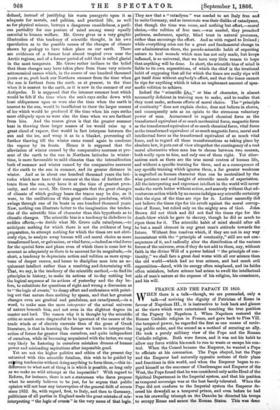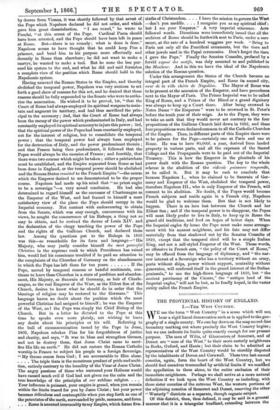FRANCE AND THE PAPACY IN 1810.
WHEN there is a talk—though, we are persuaded, only a. talk—of reviving the dignity of Patrician of Rome in favour of Napoleon III., it is instructive to look back and glance at the views which were entertained touching the true position of the Papacy by Napoleon L When Napoleon restored the Roman Catholic religion in France, and gave back to Pius VII- the temporal power, he regarded the first as one means of reviv- ing public order, and the second as a method of securing an ally.. He took a purely military view of the Pope and the Roman Catholic religion. Both were forces, and it was not his habit to allow any force within his reach to run to waste or escape his con- trol. When the Consul became the Emperor, he wanted a Pope to officiate at his coronation. The Pope obeyed, but the Pope and the Emperor had naturally opposite notions of their place and functions in this world, and when the Emperor began to re- gard himself as the successor of Charlemagne and Emperor of the West, the Pope found that he was considered only asthe Head of the Spiritual Department in the Imperial system, and that his position as temporal sovereign was at the best barely tolerated. When the Pope did not conform to the Imperial system the Emperor de- creed his downfall as a temporal prince, and even before he had won his crowning triumph on the Danube he directed his troops to occupy Rome and annex the Roman States. This was done
by decree from Vienna, it was shortly followed by that arrest of the Pope which Napoleon declared he did not order, and which gave him great dissatisfaction. " I am vexed," he wrote to Fouch6, " at this arrest of the Pope. Cardinal Pacca, should have been arrested, and the Pope should have been left in peace at Rome. But—there is no remedy ; what is done is done." Napoleon seems to have thought that he could keep Pius a prisoner, and bend him to his purpose more effectually and decently in Rome than elsewhere ; he did not want to make a martyr, he wanted to make a tool. But he none the less pur- sued his system to the end, and what he did and said furnishes a complete view of the position which Rome should hold in the Napoleonic system.
Having annexed the Roman States to the Empire, and thereby abolished the temporal power, Napoleon was very anxious to set forth a good show of reasons for this act, and he desired that these reasons should be fully expounded to the Senate who were to autho- rize the annexation. He wished it to be proved, 1st, " that the Court of Rome had always employed its spiritual weapons to main- tain and augment its territory, and had thus sacrificed the prin- cipal to the accessory ; 2nd, that the Court of Rome had always been the enemy of the power which predominated in Italy, and had constantly employed its spiritual armoury to injure this power ; 3rd, that the spiritual power of the Popes had been constantly employed, not for the interest of religion, but to consolidate the temporal power ; that the temporal power had always been employed for the destruction of Italy, and the power predominant therein ; and that France being then predominant, it followed that the Popes would always be the enemies of France ; and fourthly, that there were two courses which might be taken ; either a patriarchate must be established, and the Empire separated from Rome as had been done in England, or the temporal power should be abolished and the Roman States reunited to the French Empire "—the course which the Emperor desired to see demonstrated to be the proper course. Napoleon had made up his mind that " no priest ought to be a sovereign "—a very sound conclusion. He had also determined to regard himself as the successor of Charlemagne as the Emperor of the West, and had framed to himself a most satisfactory view of the place the Pope should occupy in the Imperial economy. Not content with endeavouring to obtain from the Senate, which was easy enough, concurrence with his views, he sought the concurrence of his Bishops, a thing not so easy to obtain, and he revived the decree of Louis XIV. and the declaration of the clergy touching the power of the Pope and the rights of the Gallivan Church, and declared them law. Among the questions put to the Bishops in 1810 was this—so remarkable for its form and language—" His Majesty, who may justly consider himself the most powerful Christian in the supreme rank to which Providence has raised him, would feel his conscience troubled if he paid no attention to the complaints of the Churches of Germany on the abandonment in which the Pope has left them for ten years If the Pope, moved by temporal reasons or hateful sentiments, con- tinues to leave these Churches in a state of perdition and abandon- ment, His Majesty, as Suzerain of Germany, as heir of Charle- magne, as the real Emperor of the West, as the Eldest Son of the Church, desires to know what he should do in order that the blessings of religion may be restored to the Germans." This language leaves no doubt about the position which the most powerful Christian had assigned to himself ; he was the Emperor of the West, an 1 the Pope was simply the Chief Bishop of the Church. But in a letter he dictated to the Pope at this time he speaks even more plainly, not wishing to leave any doubt about his principles or his will. Referring to the bull of excommunication issued by the Pope in June, 1809, Napoleon rebukes Pius for his forgetfulness of justice and charity, and says," It was to bless and strengthen thrones, and not to destroy them, that Jesus Christ came to sacri- fice His life on earth." He did not restore the Roman Catholic worship in France to subject his people to a foreign Sovereign. " My throne comes from God ; I am accountable to Him alone.
. . . . The triple tiara is the monstrous product of pride and ambi- tion, entirely contrary to the humility of the Vicar of Jesus Christ. The angry passions of those who surround your Holiness would have caused much evil if God had not given me the calm and the true knowledge of the principles of our sublime religion. . . .
Your influence is puissant, your empire is grand, when you remain within the limits traced for you by Jesus Christ ; but your power
becomes ridiculous and contemptible when you step forth as one of the potentates of the earth, surrounded by pride, menaces, and force. . . . Rome is annexed irrevocably to my Empire, which forms five- sixths of Christendom. . . . I have the mission to govern the West —don't you meddle. . . . I recognize you as my spiritual chief ; but I am your Emperor." A very imperial utterance. Acts followed words. Directions were iznmediately issued that all the archives of Rome should be forthwith sent to Paris, under a sure escort, at the rate of a hundred waggons per week. "Bring to Paris not only all the Pontifical ornaments, but the tiara and other jewels used in the Papal ceremonies. Don't forget the tiara I gave the Pope." Finally the Senatus Consulte, prefaced by a fervid exposé des nwtifs, was duly assented to and published in the llfoniteur. And in this we have the ideal of the Napoleonic solution of the Roman question.
Under this arrangement the States of the Church became an integral part of the French Empire, and Rome its second city, sour de la yule cherie de Napoleon. The Mayor of Rome was to be present at the accession of the Emperor, and have precedence next to the Mayor of Paris. The Prince Imperial was to be called King of Rome, and a Prince of the Blood or a grand dignitary was always to keep up a Court there. After being crowned in Notre Dame " the Emperors " were to be crowned in St. Peter's before the tenth year of their reign. As to the Popes, they were to take an oath that they would never act contrary to the four propositions of the Galilean Church laid down in 1682, and these four propositions were declaredcommon to all the Catholic Churches of the Empire. Then, in different parts of this Empire there were to be palaces for the Pope—certainly one at Paris and one at Rome. He was to have 80,0001. a year, derived from landed property in various parts, and all the expenses of the Sacred College and the Propaganda were to be paid out of the Imperial Treasury. This is how the Emperor in the plenitude of his power dealt with the Roman question. The key to the whole scheme is the abolition of the ridicule puissance temporelle, as he called it. But it may be rash to conclude that because Napoleon I., when he claimed to be Suzerain of Ger- many and Emperor of the West, abolished the temporal power, therefore Napoleon IlI., who is only Emperor of the French, will consent to its abolition. No doubt, if the Popes would become French subjects and reside again in a French city, Napoleon would be glad to welcome them. But that is not likely to happen. There is no love lost between the Church and her Eldest Son ; and if the temporal power is to disappear, the Popes will most likely prefer to live in Italy, to keep up in Rome the grand old traditions, and feed on hopes of better days. When the Imperial eagles fly home the Pope must make some arrange- ment with his nearest neighbour, and his fate may not differ materially from that shadowed out by the Senatus Consulte of 1810, except that the temporal chief will be a simple Italian King, and not a self-styled Emperor of the West. Those words, so offensive in French ears, " the policy of the Court of Rome," may be effaced from the language of diplomacy, and " the nar- row interest of a Sovereign who has a territory without an army, ports without ships, power without support, neutrality without guarantee, will confound itself in the grand interest of the Italian peninsula," to use the high-flown language of 1810, but " the ancient patrimony of the Caesars," the " antique land of the Imperial eagles," will not be lost, as he fondly hoped, in the vaster entity called the French Empire.































 Previous page
Previous page